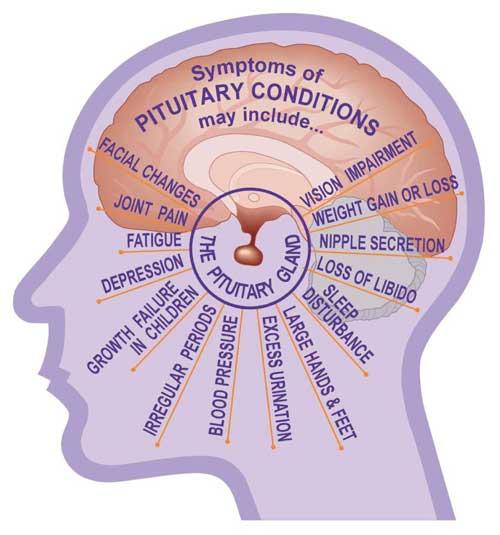28 Aug 2021 - {{hitsCtrl.values.hits}}
 The pituitary gland is a pea sized gland situated underneath the brain, in a bony hollow in the skull, positioned behind the bridge of the nose. Despite its small size the pituitary gland is referred to as the master gland of the human body as this gland is involved in producing the key set of hormones that regulate a variety of hormones secreted by the other glands, such as the thyroid, adrenal glands, the ovaries and testes.
The pituitary gland is a pea sized gland situated underneath the brain, in a bony hollow in the skull, positioned behind the bridge of the nose. Despite its small size the pituitary gland is referred to as the master gland of the human body as this gland is involved in producing the key set of hormones that regulate a variety of hormones secreted by the other glands, such as the thyroid, adrenal glands, the ovaries and testes.
 These hormones are involved in a wide range of functions. Thus, directly or indirectly, the pituitary gland controls metabolism, growth, sexual maturation, reproduction, blood pressure and many other vital physical functions. The pituitary glands and the other hormone secreting glands belong to the endocrine system, the complex hormonal network of the body.
These hormones are involved in a wide range of functions. Thus, directly or indirectly, the pituitary gland controls metabolism, growth, sexual maturation, reproduction, blood pressure and many other vital physical functions. The pituitary glands and the other hormone secreting glands belong to the endocrine system, the complex hormonal network of the body.
Pituitary disorders occur when the gland malfunctions resulting in either over production or under production of hormones. Symptoms experienced in pituitary malfunction can vary according to which hormone is affected.
A pituitary gland tumor is a group of abnormal cells that grow out of control in the pituitary gland. Most pituitary tumours are benign, which means they are non-cancerous. Each pituitary tumor is classified based on whether or not it produces hormones.
Secretory tumors, also called functioning adenomas, are involved in hormone production. While some secretory tumours produce too much of a hormone, some other tumors remain hyposecretory, where they don’t produce enough.
Secretory tumors, also called functioning adenomas, are involved in hormone production. While some secretory tumoursproduce too much of a hormone, some other tumors remain hyposecretory, where they don’t produce enough
Non-secretory tumors, also called nonfunctioning adenomas, do not affect hormone production. However, when they grow too large, they can compress the pituitary gland and other brain structures, causing headaches. Since the pituitary gland is is located close to the optic nerves, which are nerves that are connected to the eyes, visual problems arise when the tumour compresses these nerves.
Loss of peripheral vision, is common with pituitary tumours.
The symptoms of functioning tumours will depend on which hormone is produced in excess. For example, Adrenocorticotropic hormone (ACTH) is a hormone that controls how much cortisol your body makes. Excess cortisol can lead to Cushing’s syndrome, with symptoms like:
Growth hormone controls how you grow, and is involved in utilizing sugar and fat. An excess of this hormone may cause
Among men, too much prolactin can cause low sperm count and trouble getting erections.
Thyroid-stimulating hormone (TSH) is secreted by the pituitary gland to control the thyroid gland and the hormones it secretes. Too much can cause:
At times, a large tumour may compress the pituitary gland itself, resulting in inadequate hormone production. The resulting symptoms could include:
Most pituitary tumors don’t cause symptoms. As a result, they remain undiagnosed. If symptoms mentioned above persist, a consultation with a physician could pave way to early diagnosis and treatment via surgery or medical therapy.
07 May 2024 14 minute ago
07 May 2024 1 hours ago
07 May 2024 2 hours ago
07 May 2024 2 hours ago
07 May 2024 2 hours ago